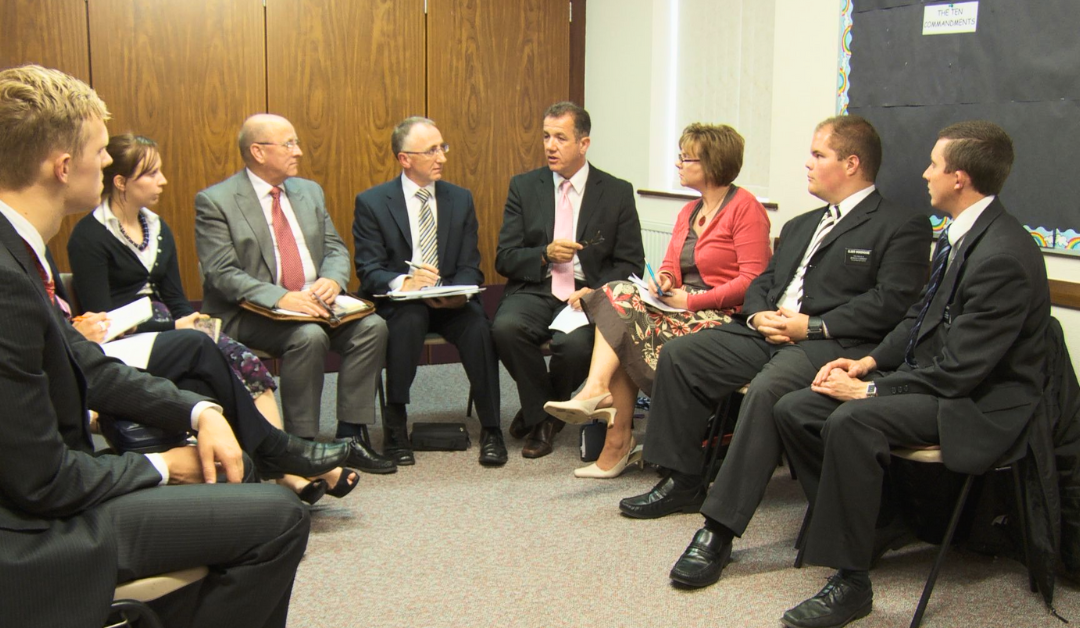I am working on a project to summarize leadership principles or thoughts on small reference cards. This approach will help leaders quickly learn a concept and facilitate discussions in council settings with other leaders. The content will include points from podcast episodes and past newsletters. I recommend you use the following message with a group of leaders. Read the card together and discuss the questions at the end.
In church leadership, we attend a lot of meetings. Most meetings get a bad rap and are more of a burden than a revelatory experience. The typical trap with meetings is that we rarely have boundaries or rules that will help the meeting proceed in a way that more people will enjoy and that will stimulate more revelation. It’s crucial for a ward council or any group that is formally meeting to have some unbreakable rules that everyone agrees upon.
Below are 7 unbreakable rules of a meeting that you can consider using in ward council or other leadership meetings. Which ones do you love and which ones do you disagree with?
Rule #1: 60-Minute Time Limit
In the past, church handbooks have advised ward council meetings should last 60-90 minutes, but realistically, no meeting needs to go longer than 60 minutes. Anything beyond that damages your effectiveness as a leader, as people lose focus and creativity plummets.
Rule #2: Anyone Can Cancel (No Excuse Required)
The leader presiding over a meeting seems to be the only one with authority to cancel a meeting. All participants of the meeting should have that same autonomy – if they need to miss a meeting for any reason, no excuse should be required. If few want to attend, it’s not a problem with absenteeism but a sign that we need to make our meetings more revelatory and worthwhile.
Rule #3: No Administration Allowed
It’s tempting to use meetings to process administrative tasks, but meetings should focus on blessing lives, not administering tasks. To avoid getting bogged down, avoid the big three NOs, (1) no downloading information that could be emailed, (2) no brainstorming that depletes time, and (3) no round-robin updates where each person gives a report. Stick to an inspired course of action to truly help people.
Rule #4: Agenda Required
Creating an effective agenda takes planning and preparation, which can be difficult amidst the busyness of church leadership. However, it’s crucial that attendees know what will be discussed and have time to process the information beforehand. The details may vary, but having an agenda allows for a focused, productive meeting.
Rule #5: No Tech
In this modern age, this may seem impossible. Many want to refer to notes or calendar details in their smartphones; however, the more we can eliminate technology distractions in the meeting, the more likely we will have an engaging discussion that leads to revelation.
Rule #6: Always Assume the Presiding Authority is Misguided
Too often we default to the presiding authority to make the final decision. A council meeting requires all involved to share their perspective that isn’t influenced by others because of their position. We should assume the presiding authorities’ role is to confirm, not originate, revelation until a final, inspired decision emerges from the group.
Rule #7: When in Doubt, Cancel the Meeting
If you haven’t figured out how to turn a meeting into a revelatory experience—cancel it. You will find not much is impacted negatively with fewer meetings.
Activity:
Use the above rules to stimulate rules you want to set in your meetings. Write them down and review them quickly at the beginning of each meeting. This is the way of revelation.
Scriptures:
Doctrine & Covenants 46:2, Doctrine & Covenants 20:55
Questions:
What should we stop, start, or continue in our meetings?
What distractions often come up in meetings?
Does the presiding authority have too much influence on the meeting?
See what other meeting ideas people are sharing HERE.
Sincerely,
Kurt Francom
Executive Director
Leading Saints
P.S. This is an older newsletter message. Get the up-to-date message weekly by subscribing for free HERE.










Oh, man, I’m trying to think of a tactful way to send this to my stake. They have a temple and family history meeting each month that is just a round Robin update from each ward. It is the most wasted hour of my month and that is saying something considering how many meetings I attend. Also, they want 3 people from each ward there – T&FH leader, RS counselor, EQ counselor.